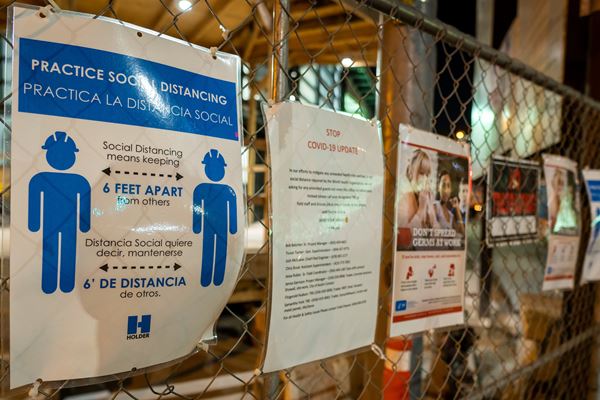Tips for Construction Claim Preparedness During COVID-19

With the daily changing developments of COVID-19 and its impact on the world around us, the construction industry is feeling the effects of mandatory closures of non-essential businesses, measures to prevent and reduce the spread of the virus, and the resulting reduction in material, equipment, and labour resources.
Although the COVID-19 pandemic is a new experience and a learning curve for all of us, there are some initial measures contractors, owners and insurance professionals can be aware of to help with claim preparedness during this time. Namely, continually being proactive, understanding the potential impact of COVID-19 on construction projects, and maintaining the right records.
Top 3 Things You Can Do
Firstly, it is important to provide notice to project stakeholders of the current impacts COVID-19 is having on the project and what potential effects you foresee as the project moves forward. Keeping the entire project team fully informed is crucial and provides the means for addressing real and potential risks. The collaboration of knowledge and viewpoints can help provide a clearer understanding of the impact of COVID-19 and the potential for mitigation.
1. Be Proactive
- Be transparent, open the channels of communication, and frequently provide updates to those involved in the project.
- Consider options to enhance the health and safety of the workforce and implement those practices.
- Refresh your knowledge of the contract project delay and force majeure clauses.
- Document, document, document! Record known and unknown schedule, scope and cost impacts, quantitative and qualitative project records, mitigation measures, etc.
- Record keeping is the single most important means of substantiating and defending a claim.
- Review insurance coverage for business interruption and force majeure.
- Seek legal counsel as part of the due diligence process.
- Issue notices to owners and other contract parties of the impacts COVID-19 has on productivity and the progress of construction.
- Update risk register and track each risk as the COVID-19 situation unfolds.
- Consider independent monitoring of the project to assess the impacts of COVID-19.
- Consult a construction claims expert.
2. Understand the Impacts of COVID-19
- The need for social distancing and site sanitation to ensure the health and safety of workers.
- Mandated site closures or changes to operating hours.
- Reduced labour availability.
- Implementation of staggered work schedules, breaks, lunches.
- Resequencing of work activities to limit the number of resources in one area.
- Limited movement about the site, i.e. personnel and material hoists, site trailers.
- Delays in approvals, design turn-around, and decision-making.
- Delayed or non-delivery of building materials and the effect on sub-trades.
- Vendor reduced hours or closure of 'non-essential' business, i.e. consultants, inspectors.
- Acceleration to maintain project milestones to the extent possible.
3. Important Records to Maintain
- Work reports (daily, weekly, and monthly progress).
- Workforce and equipment hours.
- Usage across all trades and sub-trades.
- Schedules (update at frequent intervals, include revisions due to COVID-19 related changes).
- Material deliveries and shortages, i.e. quantity expected vs. quantity received.
- Procurement logs.
- Cost records, i.e. invoices, progress payments, and COVID-19 related additional costs.
- Correspondences and correspondence logs, i.e. emails, letters, and meeting minutes.
The most successful claims are those supported by evidence to substantiate entitlement and the extent of damages incurred; extensive record keeping is paramount during this time and various legal and commercial articles debate force majeure with regards to COVID-19. However, the best ammunition during these uncertain times is being prepared.
Our experts are ready to help.

